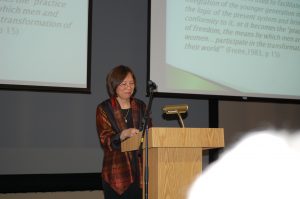Email: cascade.news@ufv.ca
 What are the markers of social justice, and how are they absent and present in Canadian universities today?
What are the markers of social justice, and how are they absent and present in Canadian universities today?
Dr. Adrienne Chan – who teaches in the school of Social Work and Human Services at UFV – presented her findings on this topic on Wednesday, November 17, in a lecture entitled: “What does social justice mean to the university?”
The event was a part of the 2010/11 University Lecture Series, which showcases UFV faculty and their research. The broad goal of Chan’s research was to discover the ways in which the idea of social justice is “conceptualized and implemented through policy and practice” in Canadian universities. The topic is of particular importance to Chan, who has devoted much of her work to social justice and focused her doctoral work on examining diversity in institutions.
Language about social justice usually includes terms like “fairness” and “equality.” It addresses issues of exclusion and discrimination. This includes access, resources, rights, and treatment for marginalized individuals and groups of people who do not share equal power in society. Most Canadian universities have readily incorporated social justice into their policies and mission statements, yet it seems that there continue to be difficulties in putting it into practice.
The first phase of Chan’s work began in 2006; this segment of the research lasted approximately a year and a half and involved collecting literature from a number of universities regarding their policies and mission statements; only information that was readily available to the public was used.
The content of these documents was then used to narrow the focus to three universities – University of British Columbia, McMaster University and St. Frances Xavier University. Additionally, UBC was chosen out of interest in determining whether the university’s size and strong research focus would have an effect on the articulation and presence of social issues.
The next phase of research involved a total of 57 on-campus interviews; each interview lasted approximately 1 hour. None of these interviews were with senior-level individuals, as Chan was interested in gaining “lived” rather than formal stories.
This phase, intended to examine the universities according to the presence of several pillars of social justice, composed of: aboriginal access, disability issues and services, human rights and harassment policies, equity and diversity policies, and the universities’ relationships with their communities. This portion of the research lasted about six months.
In examining the three universities, Chan discovered a number of common themes. Firstly, when it came to aboriginal education and inclusion, faculty said that there is still a significant disconnect. Many saw what counts as knowledge as the result of Western authority and noted that aboriginal programs often lack funding or seem to be relegated to areas of less importance.
Additionally, Chan found a common theme of containment and resistance to change among the institutions, facilitated through the process of gate-keeping and the regulation of social power. This resistance was identified as occurring at not only the level of the university, but at the level of groups and individuals as well. As the universities are concerned with maintaining the status quo, it was found that survival in the academic profession generally required compliance to the community rules, language, and culture. For example, untenured academics at UBC were afraid to publicly raise social issues for fear of endangering their position.
Chan’s research generated a number of areas of focus for universities to approach social justice. Among them, she encouraged education for de-colonization, challenging the historic attitudes that produce racism and xenophobia on campus. Additionally, she emphasized the need for open forums and spaces for discussion in order to raise and approach these social issues in universities.
Although UFV was not directly studied, Chan stated that the findings of her research have implications for UFV and can be used to critically examine our own policies and practices. Specifically, she suggested that “it would be really important to have some kind of committee working group that is interested in taking action on some of the examples that might be applied to UFV, and that should involve students, faculty, staff, administrators… but there has to be kind of an institutional will to do that and probably some kind of resourcing.”
She also spoke on the existence of several effective student-led programs at other institutions and found that these programs tend to have “better success… when there’s… longevity in the student body, like if they get involved in the first or second year.”
The next lecture in the series will be held by Dr. Olav Lian of UFV’s Department of Geography on Wednesday, January 26th. The lecture will examine the ways in which “the physical environment has responded to past changes in climate,” and will explore the implications for “climatically-driven landscape change” in the future. It will take place on the Abbotsford campus in room B121. Past lectures can be viewed in streaming video online at: http://www.ufv.ca/Research/Research_News_and_Events/lectureseries.htm


